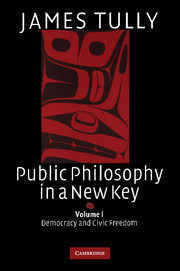Book contents
7 - The negotiation of reconciliation
Published online by Cambridge University Press: 05 September 2012
Summary
INTRODUCTION
In this chapter and the next I turn to one of the longest and most important kinds of struggles over recognition in the world. These are the struggles of over 250 million Indigenous peoples for the recognition of their right of self-determination to govern themselves over their own territories and the accommodation and reconciliation of this by the settler states that have been constructed over them during the last five hundred years. I argue in this chapter that there is a democratic way to negotiate this difficult form of reconciliation that could be acceptable to both parties. It consists in Indigenous and non-Indigenous peoples negotiating a relationship of reconciliation. On this view reconciliation is neither a form of recognition handed down to Indigenous peoples from the state nor a final settlement of some kind. It is an on-going partnership negotiated by free peoples based on principles they can both endorse and open to modification en passant. It thus illustrates my approach to struggles over recognition in what is perhaps the most difficult of cases.
On 11 December 1997 the Supreme Court of Canada released its landmark decision on Aboriginal title to land in Delgamuukw v. British Columbia. The Court explained that the ‘source’ or justification of Aboriginal title to land is ‘its recognition by the Royal Proclamation, 1763, and the relationship between the common law which recognises occupation as proof of possession, and systems of Aboriginal law pre-existing assertion of British sovereignty’.
- Type
- Chapter
- Information
- Public Philosophy in a New Key , pp. 223 - 256Publisher: Cambridge University PressPrint publication year: 2008
- 2
- Cited by

